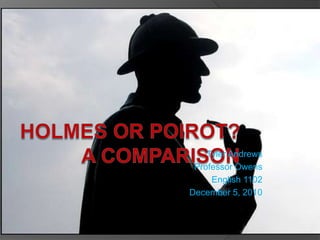
Andrews pp
- 1. Holmes or Poirot?A Comparison Tyler Andrews Professor Owens English 1102 December 5, 2010
- 2. In this presentation… A history of the authors and some things that influenced them The two fictional detectives are compared The two sidekicks are compared The overall tone, style, and effects are compared
- 3. Sir Arthur Conan Doyle He studied medicine at the University of Edinburgh, where he met Dr. Joseph Bell, the inspiration for Sherlock Holmes. The fact that Watson is also a medical doctor cannot be overlooked. Doyle actually became annoyed with Holmes, so he “killed” him in a battle with Professor Moriarty, but the public outcry forced him to resurrect Holmes nine years later. (www.mysterynet.com/holmes/)
- 4. Agatha Christie During the First World War, she worked as a nurse, which led her to the idea of using poisons in her detective stories. She originally created Poirot in his 40’s to 50’s, with the result that he was over a 100 by the time she finally killed him!
- 5. Sherlock Holmes Is cold and unemotional whenever possible. Solves mysteries using deductive reasoning to explain the available data in a satisfactory manner He arrives at his conclusions by excluding all else (Holmes himself says, “How often have I said… when you have eliminated the impossible, whatever remains, however improbable, must be the truth?” (Doyle, 93))
- 6. Hercule Poirot A small Belgian man who is considerably more emotional than Holmes. He uses psychology much more than Holmes. His mysteries, rarely take place in the same place twice (I only know of one exception, which is Curtainwhere Christie kills him)
- 7. Comparison Holmes is unemotional Holmes uses pure deduction and reason Almost all of his mysteries start or end in London Always has a sidekick, and only has one (Watson) Poirot is warm and friendly Poirot uses reason and psychology Almost never is in the same spot Rarely has a sidekick, but has had several, the main on being Hastings
- 8. The Sidekicks Both main sidekicks are usually the narrator. Both aide the main detective in some way. Both married, and both of their wives died from natural causes. Both are unable to successfully apply their detective’s methods
- 9. The Special Sidekick Christie does create quite a shocker in The Murder of Roger Ackroyd when the narrator and sidekick, Dr. James Sheppard, is actually revealed to be the murderer!
- 10. Doyle’s Mysteries Often are set in a more grey and depressing location Are much shorter and more adventurous than Christie’s Much more straight forward than Christie’s
- 11. Christie’s Mysteries Have varied and colorful locations Often involve at least one sudden twist. A slightly lighter tone is seen, with slight elements of humor at times.
- 12. Conclusion Both writers have earned their place in the halls of detective fiction fame, and both are truly excellent. The two detectives have numerous differences and a few similarities, while this is reversed in the detectives’ sidekicks. Despite the similarities, each author has their own feel that truly sets them apart.
- 13. Works Cited Doyle, Arthur C. The Sign of the Four. London: Spencer Blacket, 1890. Google Books. Web. 06 Dec. 2010. <http://books.google.com/books?id=OBM3AAAAIAAJ&printsec=frontcover&dq=the sign of the four&hl=en&ei=KUAATfSFI8GC8ga14_WhBw&sa=X&oi=book_result&ct=result&resnum=1&v>. MysteryNet. "Sherlock Holmes." MysteryNet.com. New Front Productions Inc., 2009. Web. 05 Dec. 2010. <http://www.mysterynet.com/holmes/>.